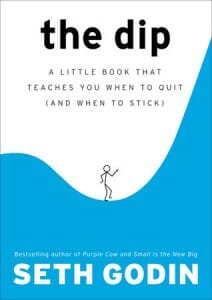I quit.
At this time in 2012, I had had it with my job. I’d been the Director of Planning at an anti-poverty agency in Somerville, Massachusetts for nine years.
In that time, the job had changed. It had started out as writing–in grant proposals, newsletters, and direct mail appeals–about the difference the agency made. It ended up being collecting and reporting data to help state and federal agency try to keep our whole program from losing its funds.
That was not the job for me, and it never would be. So, I stayed long enough to put out some fires, to document what I did, and to work through Christmas week so the people who actually celebrated the holiday could get some time off. Then, I quit.
 You would think I’d love Seth Godin’s book The Dip: A Little Book that Teaches You When to Quit (and When to Stick). I thought so too. But I was wrong.
You would think I’d love Seth Godin’s book The Dip: A Little Book that Teaches You When to Quit (and When to Stick). I thought so too. But I was wrong.
Out of a 75-page book, here’s what Godin said that I found worthwhile:
- “Never quit something with great long-term potential just because you can’t deal with the stress of the moment.”
- “Quitting [when you’re at a dead end] is better than coping because it frees you up to excel at something else.”
That’s what I did when I left my job. I could never be great at data collection and reporting. I can be great at communications (and teaching you how to communicate better). So, I quit…and I’m becoming great at what I do.
But the title of the book is a lie. It doesn’t teach you when to quit and when to stick. It just says that if you can’t be “the best in the world” at what you do, then do something else.
What’s wrong with that?
- There’s no reliable way to know if you are in “the dip” before your sales (or other numbers that measure success) start to rise, or if you’re in a cul-de-sac. You can make your best guess. But you will never know if you would have succeeded by hanging on longer, or if you would have succeeded by quitting earlier. You have nothing to compare it to. You only live once.
- Godin says the only way to succeed is to be “the best in the world” at what you do. He qualifies that by saying it’s subjective–but even so, he’s wrong. Plenty of small businesses do well by being great at what they do and accepting their market share. Enough is as good as a feast.
- Success and sales are not the same thing. Even if you’re in business, don’t you hold something more dear than your numbers? (If not, I don’t want to be married to you!)
In the nonprofit world, it’s even more clear. You don’t quit on your clients. Being great at finding people housing but ignoring the fact that they don’t have the income to pay for it is not strategic: it is ineffective and immoral, both. You have to help them find the income (even if it’s not your organizational strength) or get a partner who will do so, You can’t just walk away.
I tried to find a way to like this book more than I do, because I have enjoyed so many of Seth Godin’s blog entries. Ultimately, though, I quit.